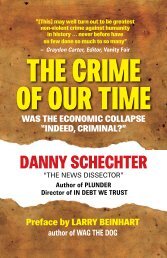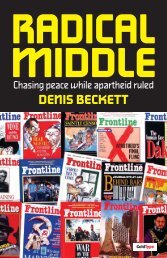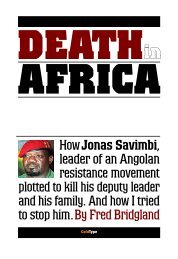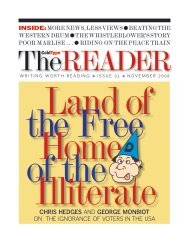UPDATED - ColdType
UPDATED - ColdType
UPDATED - ColdType
- TAGS
- updated
- coldtype
- coldtype.net
Create successful ePaper yourself
Turn your PDF publications into a flip-book with our unique Google optimized e-Paper software.
eporters and photographers out of their embed<br />
assignments, especially if the war takes more<br />
than a few weeks, but stressed that the rule still<br />
stands. “When our forces are engaged in ground<br />
combat, it is no time to bring in a new journalist<br />
to the environment,” he said this week. “Having<br />
a journalist there complicates the situation<br />
already. Having a new person does it more so.”<br />
Follow the money<br />
SOME new information about political donations<br />
by US media companies has come out. Where?<br />
In England, not in the US. You haven’t seen this<br />
on Fox or CNN. The Guardian reports: “Political<br />
donations by U.S. television and radio stations<br />
have almost doubled in the last year, research<br />
has shown.<br />
“And the Bush family’s association with many<br />
media organizations runs deep and is reflected<br />
by the hefty handouts from the likes of NBC network<br />
owner General Electric and Rupert Murdoch’s<br />
News Corporation, both trenchant supporters<br />
of the war.<br />
“The amount of money ploughed into party<br />
coffers by Rupert Murdoch’s Fox TV, NBC, and<br />
radio giant Clear Channel (among others) has<br />
gone up to £7.56m in 2001/2002, compared with<br />
just £4.6m in 2000, the latest figures reveal.”<br />
Press reunion<br />
THEY have been talking about the press up at<br />
Yale as the Yale Daily News celebrates its 75th<br />
anniversary. Former Media Channel Managing<br />
Editor Larry Bensky, an alumnus of that venerable<br />
organization, is on hand. The newspaper<br />
reports that “panelists discussed the changes<br />
WAR KILLS JOURNALISTS<br />
183<br />
necessitated by the 24-hour news cycle, where<br />
cable news can provide up-to-the-minute access<br />
and print journalists scramble to compete.<br />
Washington Post White House correspondent<br />
Dana Milbank said the Bush administration has<br />
been especially clever in using this demand for<br />
immediate news by sending out small bits of<br />
information.<br />
“There’s no time to question it, or Fox or<br />
MSNBC are going to have it,” Milbank said. “By<br />
the time we catch up and say, ‘Maybe that’s not<br />
true,’ we’re already on to something else.”<br />
Can you trust the polls?<br />
CNN trotted out new polls showing 80 percent of<br />
the people see President Bush as a strong leader<br />
(what other leader are they seeing?) 65 percent<br />
of the people think that he “cares about people<br />
like them.” The LA times reports “Some 95 percent<br />
of Americans say they are following news<br />
coverage closely and 61 percent approve of the<br />
coverage,” says a Los Angeles Times poll. In his<br />
book, ‘The New Crusade,’ Rahul Mahajan says<br />
most polling is deceptive. He writes: “Polls are<br />
notoriously volatile – they vary greatly on the<br />
background information given, on the way questions<br />
are phrased, and on the alternatives given.<br />
Responses also have no requirement of logical<br />
consistency. So to draw on very specific conclusions<br />
from these numbers would be a mistake.”<br />
There is no doubt that public opinion is affected<br />
by what people see – and don’t see – on television.”<br />
●

















